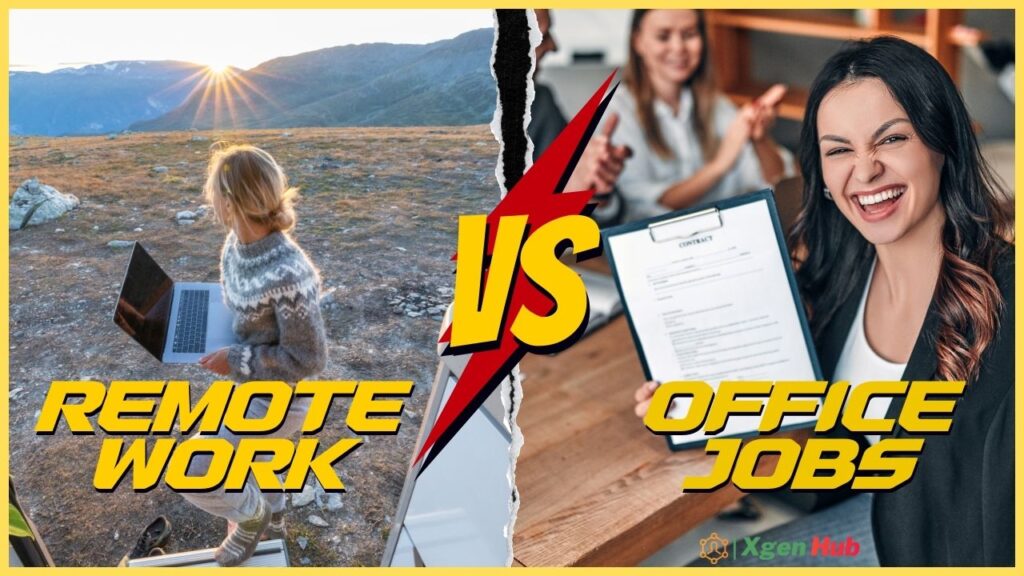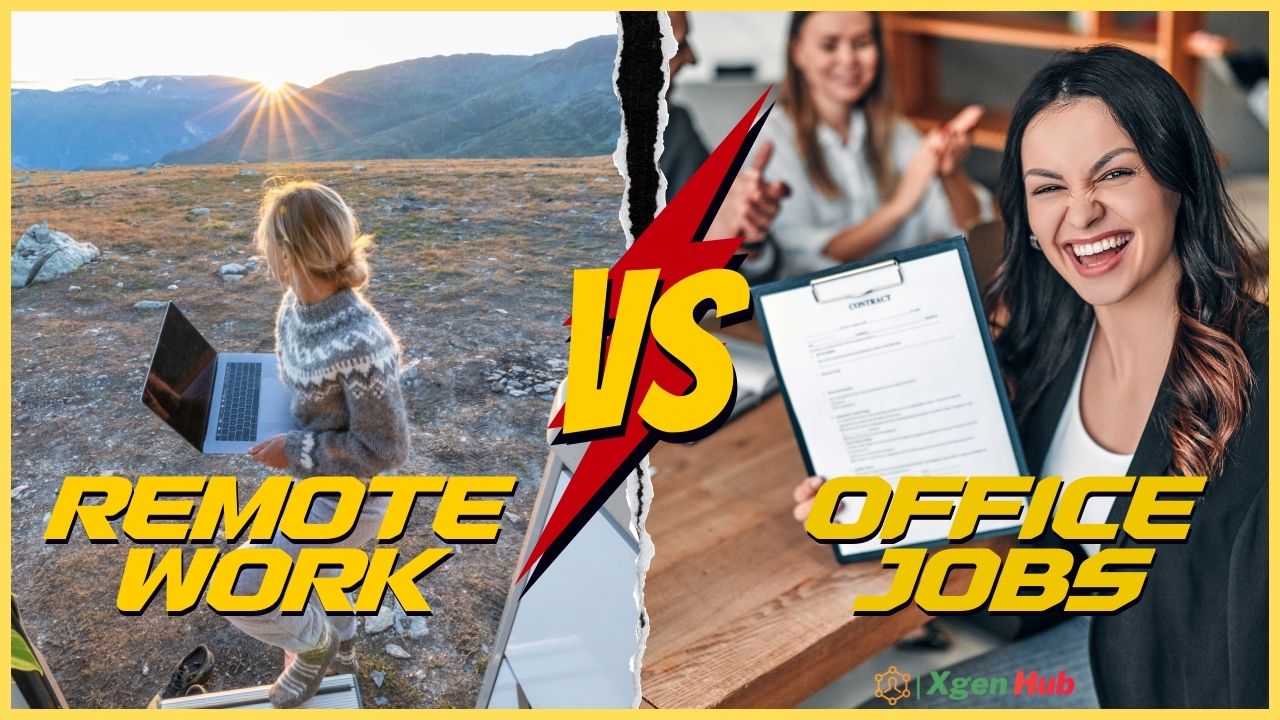Hey I’m Inzamul, Welcome to my article today I am going to breakdown Remote Work vs. Office Jobs: Pros and Cons
Remote work and office jobs represent two distinct modes of employment, each with its own set of advantages and disadvantages. As the modern workforce continues to evolve, the debate between these two options becomes increasingly relevant. In this article, we’ll explore the pros and cons of both remote work and office jobs to help you make an informed decision about which might be the better fit for you.
Unlock Your Online Success! Watch Our Exclusive Video for FREE and Start Earning Today!

Pros of Remote Work
Flexibility
Unlock Your Online Success! Watch Our Exclusive Video for FREE and Start Earning Today!
One of the most significant benefits of remote work is the flexibility it offers. Remote employees have the freedom to set their own schedules, allowing them to work when they are most productive. This flexibility can lead to better work-life balance and increased job satisfaction.
Cost-saving
Remote work can also lead to significant cost savings for both employees and employers. Without the need for a physical office space, companies can save money on rent, utilities, and office supplies. Additionally, remote employees can save money on commuting costs, work attire, and meals.
Increased productivity
Many studies have shown that remote workers are often more productive than their office-bound counterparts. Without the distractions of the office environment, remote employees can focus better on their tasks and complete them more efficiently. Additionally, remote work eliminates the need for time-consuming commutes, giving employees more time to dedicate to their work.
Cons of Remote Work
Isolation and loneliness
One of the biggest drawbacks of remote work is the potential for isolation and loneliness. Working from home can be isolating, especially for extroverted individuals who thrive on social interaction. Without the camaraderie of colleagues, remote workers may feel disconnected from their team and company culture.
Lack of structure
Another challenge of remote work is the lack of structure. Without a set schedule or designated workspace, remote employees may struggle to maintain a healthy work-life balance. Additionally, without the daily routine of commuting to an office, remote workers may find it difficult to separate their work life from their personal life.
Distractions
While remote work offers freedom and flexibility, it also comes with its own set of distractions. From household chores to family obligations, remote employees may find it challenging to stay focused on their work. Additionally, without the accountability of a traditional office environment, remote workers may be more susceptible to procrastination.
Pros of Office Jobs
Social interaction
Unlock Your Online Success! Watch Our Exclusive Video for FREE and Start Earning Today!
One of the primary benefits of office jobs is the opportunity for social interaction. Working in an office environment allows employees to collaborate with colleagues, build relationships, and foster a sense of camaraderie. These social connections can lead to increased job satisfaction and a sense of belonging.
Structured environment
Office jobs provide a structured environment that can help employees stay organized and focused. With designated workspaces, set schedules, and regular meetings, office workers have a clear framework for their day-to-day tasks. This structure can lead to increased productivity and efficiency.
Better work-life balance
Contrary to popular belief, office jobs can also offer a healthy work-life balance. By leaving work at the office, employees can mentally disconnect from their job and focus on their personal lives outside of work hours. Additionally, the physical separation of work and home can help employees avoid burnout and maintain their overall well-being.
Cons of Office Jobs
Commute time
One of the biggest downsides of office jobs is the time spent commuting to and from work. Commutes can be stressful, time-consuming, and expensive, particularly in urban areas with heavy traffic. Long commutes can eat into employees’ personal time and contribute to feelings of fatigue and burnout.
Less flexibility
Unlike remote work, office jobs offer less flexibility in terms of schedule and location. Employees are expected to be present in the office during set hours, regardless of personal commitments or preferences. This lack of flexibility can be particularly challenging for employees with caregiving responsibilities or other outside obligations.
Office politics
Office jobs often come with the added complexity of office politics. Navigating office dynamics, hierarchies, and power struggles can be exhausting and distracting for employees. Office politics can also create tension and conflict among colleagues, leading to decreased morale and productivity.
Conclusion
Unlock Your Online Success! Watch Our Exclusive Video for FREE and Start Earning Today!
In conclusion, both remote work and office jobs have their own unique set of pros and cons. Remote work offers flexibility, cost-saving opportunities, and increased productivity, but it can also lead to isolation, lack of structure, and distractions. On the other hand, office jobs provide social interaction, a structured environment, and better work-life balance, but they can also involve long commutes, less flexibility, and office politics. Ultimately, the best choice depends on individual preferences, work style, and personal circumstances.
FAQs
- Is remote work more productive than office work?
- While remote work can lead to increased productivity for some individuals, it ultimately depends on various factors such as job role, personality, and work environment.
- How can I stay motivated while working remotely?
- To stay motivated while working remotely, try setting clear goals, establishing a routine, taking regular breaks, and staying connected with colleagues.
- Are office jobs becoming obsolete?
- Office jobs are unlikely to become obsolete entirely, but the rise of remote work may lead to changes in how and where work is conducted in the future.
- What are the best practices for transitioning to remote work?
- When transitioning to remote work, it’s essential to create a dedicated workspace, establish a routine, communicate effectively with colleagues, and prioritize work-life balance.
- Can office jobs offer flexibility?
- While office jobs traditionally have less flexibility than remote work, some companies offer flexible work arrangements such as flextime, telecommuting, or compressed workweeks.
Thanks for read my article, Remote Work vs. Office Jobs: Pros and Cons
